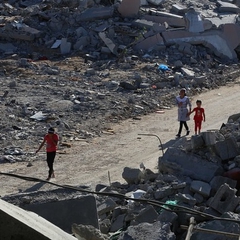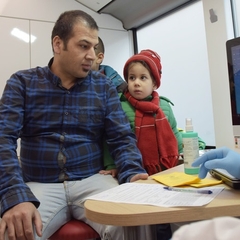Syrian Refugees Struggle with Diabetes
1 Jun 2015, 2:20 p.m. in Global Stories by James Elliott
This winter I traveled to Lebanon for a needs assessment study of Syrian refugees receiving diabetes care in Médecins Sans Frontières/Doctors Without Borders (MSF) clinics. It’s not well-known but before the conflict began, Syria had about the same proportion of people living with diabetes as the USA. Now, these people have their backs against the wall, trying to survive as their country and its health system is being destroyed.
Survival in Syria is not easy. Trying to find food in a war is challenging, let alone insulin, needles, and test strips. The war has forced many people living with diabetes to flee to neighbouring countries, like Lebanon, Turkey, Jordan and Iraq. None of these countries have public health care systems that will cover the costs of diabetes care. Humanitarian organizations, like MSF, have stepped in to avoid needless suffering and death.
I myself have type 1 diabetes. A couple weeks ago I ran out of test strips. I simply lost count of how many I had left. Since it was already evening time I figured I’d wait until morning to get more. When I finally tested the next day around noon, my blood sugar was at 15 mmol/L [270 mg/dl]. I wasn’t too surprised; I had purposely been less aggressive on my evening insulin dose to avoid a night time low I might not be able to feel.
And it hit me, what if I had only one test per week? Or none at all? What would this do for my health?
Or even further, what if I had to ration my insulin? What if I could afford only three needles in a month? Dropping or bending a needle would be disastrous. And what if I had nothing to eat but potatoes and rice? I’d certainly need to improve my carb counting if carbohydrates were all I could afford. And what if no one gave me any diabetes education whatsoever after my diagnosis? What if all these things were my reality, day in day out, for years and years with no end in sight?
This is reality for many people. They are real people with names and stories. People realizing they are slowly losing vision in their 30s. People worried they will die without a family because no one will want to marry, and pay for, someone with diabetes. People trying to bandage a foot wound that won’t heal, even though they are not even 20 years old.
There needs to be shift in thinking. When most people think about conflict or disaster medicine the first things that run through most heads are gunshot or blast wounds, starvation, or communicable diseases like cholera or scabies. And yes, these cases do happen, but in MSF’s Lebanese waiting rooms, about a quarter of patients on any given day are there for diabetes care. These are patients who need needles, insulin or pills. They need diabetes self-management education and support that makes sense for them in their situation.
There are already a large number of people trying to survive with diabetes in settings where humanitarian organizations operate and this is not going to change any time soon. In fact, as diabetes prevalence rises in areas prone to conflict, it is a situation likely to intensify. The humanitarian sector as a whole must reflect on how to best care for people who were unlucky enough to be hit with the double burden of trying to survive life as a refugee and trying to survive life with diabetes.
You can help in a number of ways. If you already donate to a humanitarian organization, ask what they are doing to help people living with diabetes. If you are a person living with diabetes who has survived a conflict situation, write to T1International so we can highlight the challenges you have faced and the need for action. Finally, check out the rest of the website and get involved to support others trying to survive life with diabetes.





